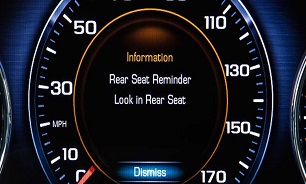
In an effort to prevent this from happening, three lawmakers
are reintroducing legislation that would require cars to be equipped with
existing technology to alert drivers that a passenger remains in the back seat
when a vehicle is turned off.
Representatives Tim Ryan (OH), Peter King (NY) and Jan Schakowsky (IL) introduced the Helping Overcome Trauma for Children Alone in Rear Seats (HOT CARS) Act of 2017 [PDF] to ensure that an alert system is standard equipment in cars.
There’s already technology available that some automakers
have introduced aimed at keeping kids from being stuck in overheating cars: In
June 2016, GM debuted a new rear seat reminder feature that sounds a warning
tone and alerts drivers to "Look In Rear Seat,” with a message flashing in the
center of the vehicle’s speedometer.
It’s this kind of technology that should be standard in all vehicles, advocates and lawmakers said in introducing the bill today at a press conference, with many pointing out cars today have alerts for just about everything else, from warnings about unbelted seatbelts to alarms for doors that have been left open.
"There is absolutely no reason why we can’t have the technology available in cars today that will allow a parent who’s hustling around, stressed out, running from here to there, to get a bell, or a ding, or a vibration, something auditory, something that’s visual, that will allow you to recognize you may have a kid in your car,” said Rep. Ryan. "There’s no reason we can’t do that.”
Dr. David Diamond, the director of the Neuroscience Collaborative Program and Center for Preclinical and Clinical Research on PTSD at the University of South Florida, noted that competing brain functions can cause a parent to lose awareness that their child is in the car.
"These are not bad parents, these are not negligent parents,” he said. "These are flaws in the brain.”
Source: Consumer Reports


